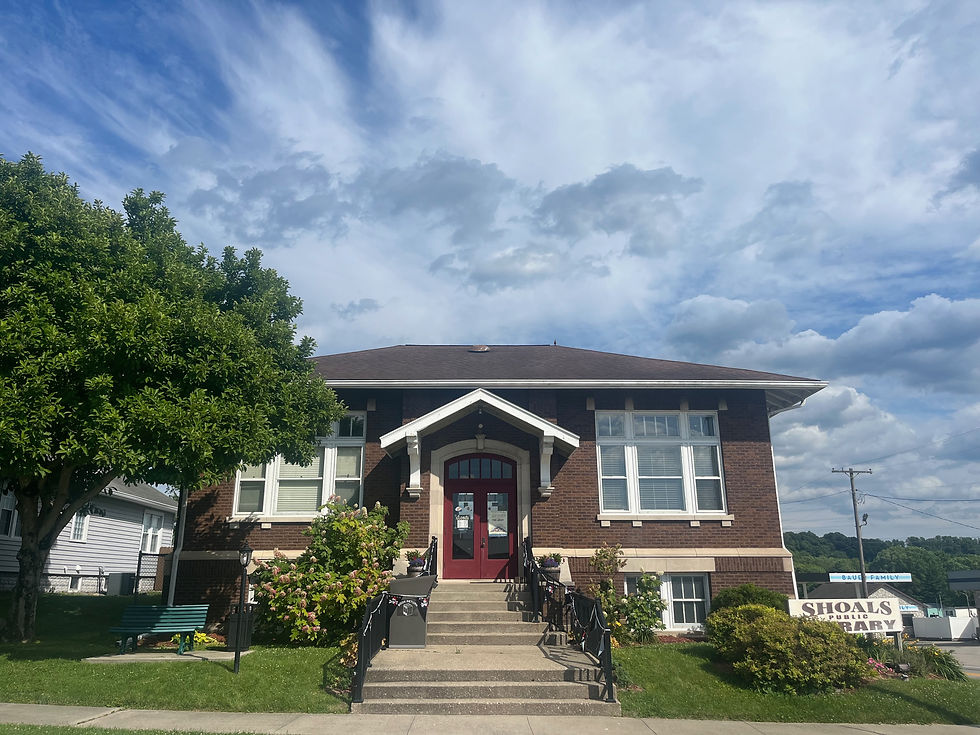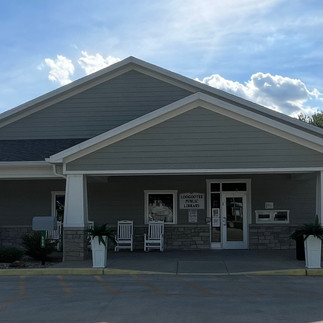Day 95, Sunday June 9, 2024: Indianapolis, Indiana to Brazil, Indiana
- Mark Carl Rom
- Jun 21, 2025
- 5 min read
Carnegie libraries visited: Bedford, Shoals, Washington, Bloomfield, Worthington, and Brazil, Indiana
Days sober: 353
I anticipated getting a solid eight in my hotel bed, as I had not slept in a hotel since Deadwood, and I neglected to turn the thermostat down there. Here, with the window unit blowing 65 degrees over my bed, I was down for the count. Until at 2.30 a screeching noise, as if a blind dentist had inserted the drill into my ear canal instead of my root canal, brought me to high alert. The drilling, whatever it actually was, only lasted 30 seconds or so but, no matter, at that moment I was as awake as one of my students whom I had cold called. For two hours I thought that reading the New York Times would somehow make me drowsy, yet that George Soros controlled communist fake news rag failed to do so.


I’ve started scheduling Sundays as a rest day, and today I decided that wasn’t a good idea. Unless I’m with friends or family, it’s hit the road for me. After an unsatisfying breakfast of biscuits and white wallpaper paste gravy and a sausage patty the size and color of a tuna tin lid, I tottled down to Indianapolis’ Central Canal district. The canal was intended to connect the Wabash and Erie canals to the Ohio River but the financial panic of 1837 put an end to that dream. Now, the one mile long canal is lined by museums, apartments and condos, although unlike the riverwalk in San Antonio no bars and only the BurgerEze and Al Fresco restaurants had doors open to hungry tourists. On this Sunday morning, the canal’s sidewalks carried only a few human runners and a few dog walkers. I did walk past one man who was sitting quietly on a bench, a plastic Sprite bottle half-filled with an amber liquid that was not Sprite by his side. I nodded to him with a sense of mutual understanding. My eight thousand step loop was my longest single walk in many months. By the time I was back at Goldfinger, my hip felt like an aching molar had been implanted, with pain running down my leg all the way to its root in my ankle. Maybe I needed strong medicine, the kind advertised on a sign at the end of the canal. Liquid Death promised to “murder your thirst” in a tallboy can embossed with a skull. The sign read “Don’t be scared. It’s just water.” And it is just that: water. It’s amazing what can be marketed with a skull.

After I check out at noon, I’m spray painting a 270 mile u-shaped tag of central Indiana, which will leave me sixty miles west of where I am now. The drive takes me through wooded hills, fruited plains, and small towns. Bedford was my favorite, as its streets were filled with families, couples, and singles enjoying what seemed to be a special celebration. I didn’t see any signs describing what the festival was about, although I did see many signs stating “Parking $10."
I’m rarely lonely. I know that, when I’m by myself, I notice the world around me much more than when I’m with another person. The downside is that I don’t have anyone to share these observations with, not in real time. Travel stories are often boring. Though they may pretend otherwise, no one really wants to hear the details of your hike down the Grand Canyon or your cruise along the Rhine. (Oops. I might need to rethink this book.) When I do travel with another person, we share those experiences and thus the stories that come from them. Had anyone been riding shotgun with me as we entered Bedford, I would have probably would have said “Festival! Let’s stop and check it out!”
Loneliness is one of our many cultural problems. A person who is truly – not just temporarily – lonely is said to damage their health in an amount equivalent to smoking half a pack of cigarettes each day. My therapist often reminds me of the importance of having a broad network of friends and a deep connection with a few. A core concept of recovery groups is “you can’t do this on your own, and you don’t have to.” A story I heard at one meeting goes something like this. A minister was admonishing his flock to dedicate their weekends to serving the needy in the name of God. One weekend, a parishioner visiting a neighboring town found the minister playing golf.
Outraged at the hypocrisy, the parishioner prayed, “This minister is a hypocrite in your name. I pray for you to give him the punishment he deserves.”
God replies “I will.”
The next week, the parishioner went back to that golf course and caught the minister playing another round. He watched in astonishment as the minister miraculously hit one hole-in-one after another.
Stunned, the parishioner again rings up God: “You promised you would punish that hypocrite. I just watched him playing the most amazing round of golf ever!”
God replies: “Yeah, and who is he going to be able to tell?”
Bedford has a couple of claims to fame. It bills itself as the Limestone Capital of the World, and its light gray limestone has been used in many of Washington, DC’s monuments. The high school’s boys’ golf team holds the Indiana record in all sports for most trips to the state finals without a championship: 27. I trust that the coach takes comfort from Susan Lucci, the All My Children star who was nominated for an Emmy as the Outstanding Lead Actress in a Daytime Drama 19 times before she finally brought home the gold. Her Emmy nominations did not come down the chimney every Christmas: she starred in the role of Erica Kane for 41 years.

A married couple, Mr. Joseph R. Voris and Mrs. Katherine Voris, were the ones petitioning for Bedford library. (Mr. wrote on the letterhead of the Citizens Bank of Bedford, which has an A.C. Voris as President; Mrs. on plain paper without mention of any formal role.) Who knows what they talked about at the dinner table; it’s clear that their letters were not exactly carefully coordinated, although at one point Mr. Voris writes
Mrs. Voris tells me that she has had one or two letters from you…I know that you are overwhelmed with letters of this kind, but being Secy of the library association I feel that I would not be doing my duty if I did not get the facts properly before you.
Bertram’s responses to the Voris’s repeated requests are not in the file, excepting to the letter that Mrs. Voss wrote asking Carnegie to increase the $10,000 he had pledged, given the town’s growth since the initial request (“he regrets that he does not see his way to add to it”). Carnegie ultimately did give $20,000 to Bedford in 1902. The library’s website makes no mention of its history.

“The Shoals Public Library is a Carnegie Library that was constructed in 1914.” That’s the full extent of this library’s history on its website. The Carnegie archives tell a deeper story of community struggle. In 1913, while a grant was in the works, “floods... devastated our community [and] engendered a heavy loss on our people…On account of the conditions we find ourselves in…there will be some delay in arranging the preliminaries…” The flood hit as Shoals had reached its peak population of just over 1000; it never grew larger than that, and by 2020 it had shrunk to under 700. Still, the library’s history has not ended. Not only does it survive, it grows: in 2025, a renovation and expansion was launched with the “overwhelming financial support from the community, friends, and neighbors.”

The Washington Carnegie Public Library was the first of the 164 Carnegie-funded public libraries built in Indiana. Was it because, in 1901, the “city was composed of a high-spirited, aggressive, industrious people – just the class that would reap the most benefits from a good library”? Bertram remained silent on this point.


















Comments